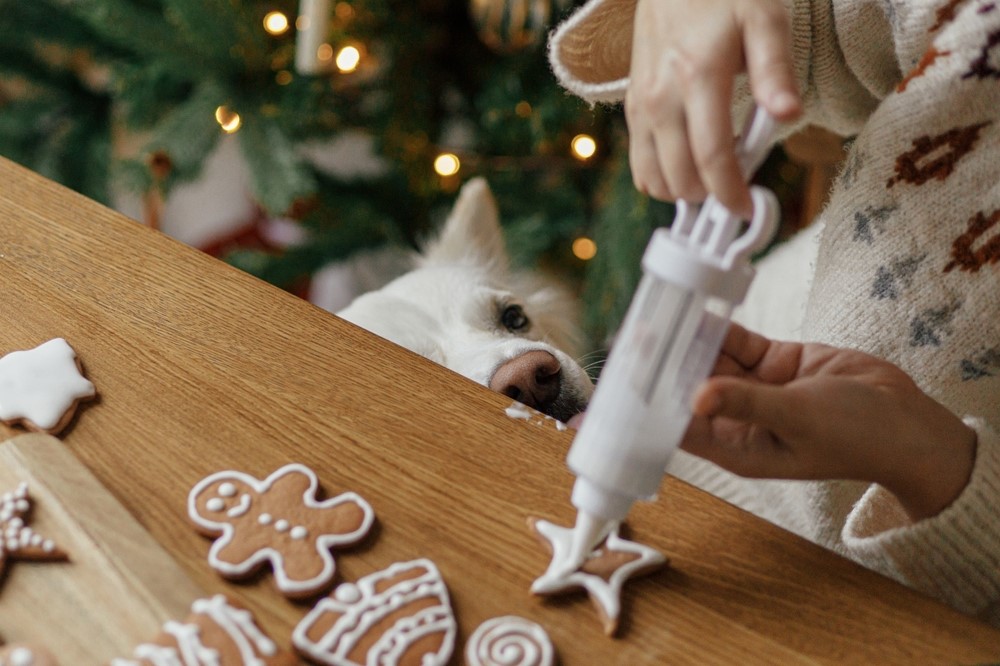Pet Safety During the Holidays: Tips for Pet Owners

The holiday season is a magical time filled with festive gatherings, delicious food, and cozy decorations! For pets, though, this season can bring some new and unexpected risks. As responsible pet owners, it’s our job to anticipate as many potential hazards as we can to keep our furry companions safe and happy. Here are some simple things you can do to help keep your pet safe and cozy during the holidays:
Watch out for holiday food bandits
Platters of aromatic holiday food are a huge temptation for pets, but most festive treats are harmful to their health. In fact, it’s better to keep every kind of human food out of paw’s reach. Common holiday ingredients such as chocolate, grapes, raisins, onions, garlic, and alcohol are toxic to practically all pets. Even chicken isn’t as safe as it sounds – it’s often marinated in toxic spices, and poultry bones can splinter and cause choking or internal injuries. Bone-free fatty foods can still lead to serious health issues, like pancreatitis. To keep your pets safe, always avoid sharing table scraps and instead opt to treat your furry friends with pet-safe snacks or vet-approved holiday treats.
Lock down the jingle bells
Holiday decorations, while beautiful, can of course pose serious dangers to curious pets. For everyone’s safety, Christmas trees should be securely anchored to prevent tipping if a pet jumps or climbs on them. Fragile ornaments and tinsel are particularly risky, as broken glass can cause injuries to pets and humans alike, and ingested tinsel may lead to life-threatening (expensive) intestinal blockages. You should also cover electrical cords used for lights and decorations or keep them out of reach to prevent pets from chewing on them and risking electric shock. A little extra caution can go a long way!
Have a plan B for keeping paws warm
Canadian winters are known for their biting cold, which can be as uncomfortable for pets as it is for people. During particularly frigid days, limit outdoor time and make sure the indoors are a cozy temperature. You might even opt to provide your pet with extra layers like sweaters or coats, especially for small or short-haired breeds, or simply a warm bed and blanket. For walks and outside time, keep in mind that the salt used on sidewalks can irritate or injure paws, so consider picking up a tin of pet-safe paw balm or even protective booties.
Winter storms can also lead to power outages that leave homes without heat, putting both you and your pets at risk. It’s a good idea for all Canadians to have an emergency kit ready with essentials such as blankets, extra pet food, water, and portable heating options like hot water bottles wrapped in towels. You can also use chemical-based handwarmers if securely wrapped in a mitten or a sock, especially for small pets that can be especially cold-sensitive. Worst case scenario, if the outage lasts longer than expected, know where nearby pet-friendly shelters or hotels are in case evacuation becomes necessary.
Consider your pets during holiday visits
The excitement of holiday gatherings can easily overwhelm pets, especially those with sensitive hearing or those not used to large crowds. The good news is you can minimize the stress pretty simply. First, create a designated safe space where your pet can retreat during festivities. This quiet area should include their bed, fresh water, and favorite toys to help them feel secure. If your pet is smaller, close the door to the room they live in to help keep the noise down. It’s also helpful to set some boundaries with guests of all ages – they should never feed your pet without permission, manhandle them, or enter their safe space uninvited.
Pet escapes: protect against the worst-case scenario
With family and friends coming and going during the holidays, the risk of pets escaping through open doors increases, and the cold temperatures mean that an escape is more dangerous to their health than at other times of the year. To prevent a slip and run, you could try placing baby gates near entrances to act as an additional barrier. Even at home, make sure your pet wears a collar with up-to-date ID tags and has a registered microchip so they can be quickly identified and returned if they do manage to escape. Take charge of the doors when guests arrive and leave and consider even taking the time to train your pet to have a “welcome” routine for when visitors are at the door.
Good luck creating a safe and welcoming environment for your pet this holiday season! The holidays are a time for celebration, but they’re also an opportunity to show extra care and gratitude for the animals who bring so much joy to our lives.
From protecting them from festive hazards to preparing for unexpected winter challenges, a little planning goes a long way in keeping your furry friends safe and comfortable.



